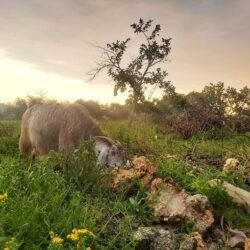| Source (Aramaic) | Translation (Gothic) | Hebraization (Judeo-Gothic) | Romanization (Gothic-Latin) | Translation (English) |
|---|---|---|---|---|
חַד גַּדְיָא, חַד גַּדְיָא. דְּזַבִּן אַבָּא בִּתְרֵי זוּזֵי, חַד גַּדְיָא, חַד גַּדְיָא. |
𐌰𐌹𐌽 𐌲𐌰𐌹𐍄𐌴𐌹𐌽, 𐌰𐌹𐌽 𐌲𐌰𐌹𐍄𐌴𐌹𐌽 𐌸𐌰𐍄𐌴𐌹 𐌱𐌰𐌿𐌷𐍄𐌰 𐌰𐍄𐍄𐌰 𐌼𐌴𐌹𐌽𐍃 𐌿𐌽𐌳 𐍄𐍅𐌰𐌹𐌼 𐍃𐌺𐌰𐍄𐍄𐌰𐌼 𐌰𐌹𐌽 𐌲𐌰𐌹𐍄𐌴𐌹𐌽, 𐌰𐌹𐌽 𐌲𐌰𐌹𐍄𐌴𐌹𐌽 |
ען גּעטיִן, ען גּעטיִן, תֿאַטיִ בּאָחטאַ אַטטאַ מִינס אוּנדּ טועם סקאַטטאַם ען גּעטיִן, ען גּעטיִן |
ain gaitein, ain gaitein þatei bauhta atta meins und twaim skattam ain gaitein, ain gaitein | |
וְאָתָא שֻׁנְרָא וְאָכְלָה לְגַדְיָא, דְּזַבִּן אַבָּא בִּתְרֵי זוּזֵי, חַד גַּדְיָא, חַד גַּדְיָא. |
𐌸𐌰𐌽 𐌵𐌰𐌼 𐌺𐌰𐍄𐍄𐌿𐍃 𐌾𐌰𐌷 𐌴𐍄 𐌲𐌰𐌹𐍄𐌴𐌹𐌽 𐌸𐌰𐍄𐌴𐌹 𐌱𐌰𐌿𐌷𐍄𐌰 𐌰𐍄𐍄𐌰 𐌼𐌴𐌹𐌽𐍃 𐌿𐌽𐌳 𐍄𐍅𐌰𐌹𐌼 𐍃𐌺𐌰𐍄𐍄𐌰𐌼 𐌰𐌹𐌽 𐌲𐌰𐌹𐍄𐌴𐌹𐌽, 𐌰𐌹𐌽 𐌲𐌰𐌹𐍄𐌴𐌹𐌽 |
תֿאַן קואַם קאַטטוּס יּאַח אײֵט גּעטיִן תֿאַטיִ בּאָחטאַ אַטטאַ מִינס אוּנדּ טועם סקאַטטאַם ען גּעטיִן, ען גּעטיִן |
þan qam kattus jah ēt gaitein þatei bauhta atta meins und twaim skattam ain gaitein, ain gaitein |
Then came the cat and ate the little goat, that my father had bought with two sceats, one little goat, one little goat. |
וְאָתָא כַּלְבָּא וְנָשַׁךְ לְשֻׁנְרָא, דְּאָכְלָה לְגַדְיָא, דְּזַבִּן אַבָּא בִּתְרֵי זוּזֵי, חַד גַּדְיָא, חַד גַּדְיָא. |
𐌸𐌰𐌽 𐌵𐌰𐌼 𐌷𐌿𐌽𐌳𐍃 𐌾𐌰𐌷 𐌱𐌰𐌹𐍄 𐌺𐌰𐍄𐍄𐌿 𐍃𐌰𐌴𐌹 𐌴𐍄 𐌲𐌰𐌹𐍄𐌴𐌹𐌽 𐌸𐌰𐍄𐌴𐌹 𐌱𐌰𐌿𐌷𐍄𐌰 𐌰𐍄𐍄𐌰 𐌼𐌴𐌹𐌽𐍃 𐌿𐌽𐌳 𐍄𐍅𐌰𐌹𐌼 𐍃𐌺𐌰𐍄𐍄𐌰𐌼 𐌰𐌹𐌽 𐌲𐌰𐌹𐍄𐌴𐌹𐌽, 𐌰𐌹𐌽 𐌲𐌰𐌹𐍄𐌴𐌹𐌽 |
תֿאַן קואַם הוּנדּס יּאַח בּעט קאַטטוּ סאַיִ אײֵט גּעטיִן תֿאַטיִ בּאָחטאַ אַטטאַ מִינס אוּנדּ טועם סקאַטטאַם ען גּעטיִן, ען גּעטיִן |
þan qam hunds jah bait kattu saei ēt gaitein þatei bauhta atta meins und twaim skattam ain gaitein, ain gaitein |
Then came the dog and bit the cat, that had eaten the little goat, that my father had bought with two sceats, one little goat, one little goat. |
וְאָתָא חֻטְרָא וְהִכָּה לְכַלְבָּא, דְּנָשַׁךְ לְשֻׁנְרָא, דְּאָכְלָה לְגַדְיָא, דְּזַבִּן אַבָּא בִּתְרֵי זוּזֵי, חַד גַּדְיָא, חַד גַּדְיָא. |
𐌸𐌰𐌽 𐌵𐌰𐌼 𐌷𐍂𐌿𐌲𐌲𐌰 𐌾𐌰𐌷 𐌱𐌻𐌰𐌲𐌲𐍅 𐌷𐌿𐌽𐌳 𐍃𐌰𐌴𐌹 𐌱𐌰𐌹𐍄 𐌺𐌰𐍄𐍄𐌿 𐍃𐌰𐌴𐌹 𐌴𐍄 𐌲𐌰𐌹𐍄𐌴𐌹𐌽 𐌸𐌰𐍄𐌴𐌹 𐌱𐌰𐌿𐌷𐍄𐌰 𐌰𐍄𐍄𐌰 𐌼𐌴𐌹𐌽𐍃 𐌿𐌽𐌳 𐍄𐍅𐌰𐌹𐌼 𐍃𐌺𐌰𐍄𐍄𐌰𐌼 𐌰𐌹𐌽 𐌲𐌰𐌹𐍄𐌴𐌹𐌽, 𐌰𐌹𐌽 𐌲𐌰𐌹𐍄𐌴𐌹𐌽 |
תֿאַן קואַם חרוּנׄגּאַ יּאַח בּלאַנׄגּו הוּנדּ סאַיִ בּעט קאַטטוּ סאַיִ אײֵט גּעטיִן תֿאַטיִ בּאָחטאַ אַטטאַ מִינס אוּנדּ טועם סקאַטטאַם ען גּעטיִן, ען גּעטיִן |
þan qam hrugga jah blaggw hund saei bait kattu saei ēt gaitein þatei bauhta atta meins und twaim skattam ain gaitein, ain gaitein |
Then came the stick, and struck the dog, that had bitten the cat, that had eaten the little goat, that my father had bought with two sceats, one little goat, one little goat. |
וְאָתָא נוּרָא וְשָׂרַף לְחֻטְרָא, דְּהִכָּה לְכַלְבָּא, דְּנָשַׁךְ לְשֻׁנְרָא, דְּאָכְלָה לְגַדְיָא, דְּזַבִּן אַבָּא בִּתְרֵי זוּזֵי, חַד גַּדְיָא, חַד גַּדְיָא. |
𐌸𐌰𐌽 𐌵𐌰𐌼 𐍆𐍉𐌽 𐌾𐌰𐌷 𐌲𐌰𐍄𐌰𐌽𐌳𐌹𐌳𐌰 𐌷𐍂𐌿𐌲𐌲𐌰 𐍃𐍉𐌴𐌹 𐌱𐌻𐌰𐌲𐌲𐍅 𐌷𐌿𐌽𐌳 𐍃𐌰𐌴𐌹 𐌱𐌰𐌹𐍄 𐌺𐌰𐍄𐍄𐌿 𐍃𐌰𐌴𐌹 𐌴𐍄 𐌲𐌰𐌹𐍄𐌴𐌹𐌽 𐌸𐌰𐍄𐌴𐌹 𐌱𐌰𐌿𐌷𐍄𐌰 𐌰𐍄𐍄𐌰 𐌼𐌴𐌹𐌽𐍃 𐌿𐌽𐌳 𐍄𐍅𐌰𐌹𐌼 𐍃𐌺𐌰𐍄𐍄𐌰𐌼 𐌰𐌹𐌽 𐌲𐌰𐌹𐍄𐌴𐌹𐌽, 𐌰𐌹𐌽 𐌲𐌰𐌹𐍄𐌴𐌹𐌽 |
תֿאַן קואַם פֿוֹן יּאַח גּאַטאַנדּידֿאַ חרוּנׄגּאַ סוֹיִ בּלאַנׄגּו הוּנדּ סאַיִ בּעט קאַטטוּ סאַיִ אײֵט גּעטיִן תֿאַטיִ בּאָחטאַ אַטטאַ מִינס אוּנדּ טועם סקאַטטאַם ען גּעטיִן, ען גּעטיִן |
þan qam fōn jah gatandida hrugga soei blaggw hund saei bait kattu saei ēt gaitein þatei bauhta atta meins und twaim skattam ain gaitein, ain gaitein |
Then came the fire, and burned up the stick, that had struck the dog, that had bitten the cat, that had eaten the little goat, that my father had bought with two sceats, one little goat, one little goat. |
וְאָתָא מַיָּא וְכָבָה לְנוּרָא, דְּשָׂרַף לְחֻטְרָא, דְּהִכָּה לְכַלְבָּא, דְּנָשַׁךְ לְשֻׁנְרָא, דְּאָכְלָה לְגַדְיָא, דְּזַבִּן אַבָּא בִּתְרֵי זוּזֵי, חַד גַּדְיָא, חַד גַּדְיָא. |
𐌸𐌰𐌽 𐌵𐌰𐌼 𐍅𐌰𐍄𐍉 𐌾𐌰𐌷 𐌰𐍆𐍈𐌰𐍀𐌹𐌳𐌰 𐍆𐍉𐌽 𐌸𐌰𐍄𐌴𐌹 𐌲𐌰𐍄𐌰𐌽𐌳𐌹𐌳𐌰 𐌷𐍂𐌿𐌲𐌲𐌰 𐍃𐍉𐌴𐌹 𐌱𐌻𐌰𐌲𐌲𐍅 𐌷𐌿𐌽𐌳 𐍃𐌰𐌴𐌹 𐌱𐌰𐌹𐍄 𐌺𐌰𐍄𐍄𐌿 𐍃𐌰𐌴𐌹 𐌴𐍄 𐌲𐌰𐌹𐍄𐌴𐌹𐌽 𐌸𐌰𐍄𐌴𐌹 𐌱𐌰𐌿𐌷𐍄𐌰 𐌰𐍄𐍄𐌰 𐌼𐌴𐌹𐌽𐍃 𐌿𐌽𐌳 𐍄𐍅𐌰𐌹𐌼 𐍃𐌺𐌰𐍄𐍄𐌰𐌼 𐌰𐌹𐌽 𐌲𐌰𐌹𐍄𐌴𐌹𐌽, 𐌰𐌹𐌽 𐌲𐌰𐌹𐍄𐌴𐌹𐌽 |
תֿאַן קואַם ואַטוֹ יּאַח אַפֿחואַפּידֿאַ פֿוֹן תֿאַטיִ גּאַטאַנדּידֿאַ חרוּנׄגּאַ סוֹיִ בּלאַנׄגּו הוּנדּ סאַיִ בּעט קאַטטוּ סאַיִ אײֵט גּעטיִן תֿאַטיִ בּאָחטאַ אַטטאַ מִינס אוּנדּ טועם סקאַטטאַם ען גּעטיִן, ען גּעטיִן |
þan qam watō jah afƕapida fōn þatei gatandida hrugga soei blaggw hund saei bait kattu saei ēt gaitein þatei bauhta atta meins und twaim skattam ain gaitein, ain gaitein |
Then came the water, and quenched the fire, that had burned up the stick, that had struck the dog, that had bitten the cat, that had eaten the little goat, that my father had bought with two sceats, one little goat, one little goat. |
וְאָתָא תּוֹרָא וְשָׁתָא לְמַיָּא, דְּכָבָה לְנוּרָא, דְּשָׂרַף לְחֻטְרָא, דְּהִכָּה לְכַלְבָּא, דְּנָשַׁךְ לְשֻׁנְרָא, דְּאָכְלָה לְגַדְיָא, דְּזַבִּן אַבָּא בִּתְרֵי זוּזֵי, חַד גַּדְיָא, חַד גַּדְיָא. |
𐌸𐌰𐌽 𐌵𐌰𐌼 𐌰𐌿𐌷𐍃𐌰 𐌾𐌰𐌷 𐌳𐍂𐌰𐌲𐌺 𐍅𐌰𐍄𐍉 𐌸𐌰𐍄𐌴𐌹 𐌰𐍆𐍈𐌰𐍀𐌹𐌳𐌰 𐍆𐍉𐌽 𐌸𐌰𐍄𐌴𐌹 𐌲𐌰𐍄𐌰𐌽𐌳𐌹𐌳𐌰 𐌷𐍂𐌿𐌲𐌲𐌰 𐍃𐍉𐌴𐌹 𐌱𐌻𐌰𐌲𐌲𐍅 𐌷𐌿𐌽𐌳 𐍃𐌰𐌴𐌹 𐌱𐌰𐌹𐍄 𐌺𐌰𐍄𐍄𐌿 𐍃𐌰𐌴𐌹 𐌴𐍄 𐌲𐌰𐌹𐍄𐌴𐌹𐌽 𐌸𐌰𐍄𐌴𐌹 𐌱𐌰𐌿𐌷𐍄𐌰 𐌰𐍄𐍄𐌰 𐌼𐌴𐌹𐌽𐍃 𐌿𐌽𐌳 𐍄𐍅𐌰𐌹𐌼 𐍃𐌺𐌰𐍄𐍄𐌰𐌼 𐌰𐌹𐌽 𐌲𐌰𐌹𐍄𐌴𐌹𐌽, 𐌰𐌹𐌽 𐌲𐌰𐌹𐍄𐌴𐌹𐌽 |
תֿאַן קואַם אָחסאַ יּאַח דּראַנׄק ואַטוֹ תֿאַטיִ אַפֿחואַפּידֿאַ פֿוֹן תֿאַטיִ גּאַטאַנדּידֿאַ חרוּנׄגּאַ סוֹיִ בּלאַנׄגּו הוּנדּ סאַיִ בּעט קאַטטוּ סאַיִ אײֵט גּעטיִן תֿאַטיִ בּאָחטאַ אַטטאַ מִינס אוּנדּ טועם סקאַטטאַם ען גּעטיִן, ען גּעטיִן |
þan qam auhsa jah dragk watō þatei afƕapida fōn þatei gatandida hrugga soei blaggw hund saei bait kattu saei ēt gaitein þatei bauhta atta meins und twaim skattam ain gaitein, ain gaitein |
Then came the bull, and drank the water, that had quenched the fire, that had burned up the stick, that had struck the dog, that had bitten the cat, that had eaten the little goat, that my father had bought with two sceats, one little goat, one little goat. |
וְאָתָא הַשּׁוֹחֵט וְשָׁחַט לְתוֹרָא, דְּשָׁתָא לְמַיָּא, דְּכָבָה לְנוּרָא, דְּשָׂרַף לְחֻטְרָא, דְּהִכָּה לְכַלְבָּא, דְּנָשַׁךְ לְשֻׁנְרָא, דְּאָכְלָה לְגַדְיָא, דְּזַבִּן אַבָּא בִּתְרֵי זוּזֵי, חַד גַּדְיָא, חַד גַּדְיָא. |
𐌸𐌰𐌽 𐌵𐌰𐌼 𐍃𐌺𐌹𐌻𐌾𐌰 𐌾𐌰𐌷 𐌿𐍆𐍃𐌽𐌰𐌹𐌸 𐌰𐌿𐌷𐍃𐌰𐌿 𐍃𐌰𐌴𐌹 𐌳𐍂𐌰𐌲𐌺 𐍅𐌰𐍄𐍉 𐌸𐌰𐍄𐌴𐌹 𐌰𐍆𐍈𐌰𐍀𐌹𐌳𐌰 𐍆𐍉𐌽 𐌸𐌰𐍄𐌴𐌹 𐌲𐌰𐍄𐌰𐌽𐌳𐌹𐌳𐌰 𐌷𐍂𐌿𐌲𐌲𐌰 𐍃𐍉𐌴𐌹 𐌱𐌻𐌰𐌲𐌲𐍅 𐌷𐌿𐌽𐌳 𐍃𐌰𐌴𐌹 𐌱𐌰𐌹𐍄 𐌺𐌰𐍄𐍄𐌿 𐍃𐌰𐌴𐌹 𐌴𐍄 𐌲𐌰𐌹𐍄𐌴𐌹𐌽 𐌸𐌰𐍄𐌴𐌹 𐌱𐌰𐌿𐌷𐍄𐌰 𐌰𐍄𐍄𐌰 𐌼𐌴𐌹𐌽𐍃 𐌿𐌽𐌳 𐍄𐍅𐌰𐌹𐌼 𐍃𐌺𐌰𐍄𐍄𐌰𐌼 𐌰𐌹𐌽 𐌲𐌰𐌹𐍄𐌴𐌹𐌽, 𐌰𐌹𐌽 𐌲𐌰𐌹𐍄𐌴𐌹𐌽 |
תֿאַן קואַם סקיליּאַ יּאַח אוּפסנעתֿ אָחסאָ סאַיִ דּראַנׄק ואַטוֹ תֿאַטיִ אַפֿחואַפּידֿאַ פֿוֹן תֿאַטיִ גּאַטאַנדּידֿאַ חרוּנׄגּאַ סוֹיִ בּלאַנׄגּו הוּנדּ סאַיִ בּעט קאַטטוּ סאַיִ אײֵט גּעטיִן תֿאַטיִ בּאָחטאַ אַטטאַ מִינס אוּנדּ טועם סקאַטטאַם ען גּעטיִן, ען גּעטיִן |
þan qam skilja jah ufsnaiþ auhsau saei dragk watō þatei afƕapida fōn þatei gatandida hrugga soei blaggw hund saei bait kattu saei ēt gaitein þatei bauhta atta meins und twaim skattam ain gaitein, ain gaitein |
Then came the slaughterer, and slaughtered the bull, that had drunk the water, that had quenched the fire, that had burned up the stick, that had struck the dog, that had bitten the cat, that had eaten the little goat, that my father had bought with two sceats, one little goat, one little goat. |
וְאָתָא מַלְאַךְ־הַמָּ֫וֶת וְשָׁחַט לְשׁוֹחֵט, דְּשָׁחַט לְתוֹרָא, דְּשָׁתָא לְמַיָּא, דְּכָבָה לְנוּרָא, דְּשָׂרַף לְחֻטְרָא, דְּהִכָּה לְכַלְבָּא, דְּנָשַׁךְ לְשֻׁנְרָא, דְּאָכְלָה לְגַדְיָא, דְּזַבִּן אַבָּא בִּתְרֵי זוּזֵי, חַד גַּדְיָא, חַד גַּדְיָא. |
𐌸𐌰𐌽 𐌵𐌰𐌼 𐌰𐌲𐌲𐌹𐌻𐌿𐍃 𐌳𐌰𐌿𐌸𐌰𐌿𐍃 𐌾𐌰𐌷 𐌿𐍆𐍃𐌽𐌰𐌹𐌸 𐍃𐌺𐌹𐌻𐌾𐌰𐌽 𐍃𐌰𐌴𐌹 𐌿𐍆𐍃𐌽𐌰𐌹𐌸 𐌰𐌿𐌷𐍃𐌰𐌿 𐍃𐌰𐌴𐌹 𐌳𐍂𐌰𐌲𐌺 𐍅𐌰𐍄𐍉 𐌸𐌰𐍄𐌴𐌹 𐌰𐍆𐍈𐌰𐍀𐌹𐌳𐌰 𐍆𐍉𐌽 𐌸𐌰𐍄𐌴𐌹 𐌲𐌰𐍄𐌰𐌽𐌳𐌹𐌳𐌰 𐌷𐍂𐌿𐌲𐌲𐌰 𐍃𐍉𐌴𐌹 𐌱𐌻𐌰𐌲𐌲𐍅 𐌷𐌿𐌽𐌳 𐍃𐌰𐌴𐌹 𐌱𐌰𐌹𐍄 𐌺𐌰𐍄𐍄𐌿 𐍃𐌰𐌴𐌹 𐌴𐍄 𐌲𐌰𐌹𐍄𐌴𐌹𐌽 𐌸𐌰𐍄𐌴𐌹 𐌱𐌰𐌿𐌷𐍄𐌰 𐌰𐍄𐍄𐌰 𐌼𐌴𐌹𐌽𐍃 𐌿𐌽𐌳 𐍄𐍅𐌰𐌹𐌼 𐍃𐌺𐌰𐍄𐍄𐌰𐌼 𐌰𐌹𐌽 𐌲𐌰𐌹𐍄𐌴𐌹𐌽, 𐌰𐌹𐌽 𐌲𐌰𐌹𐍄𐌴𐌹𐌽 |
תֿאַן קואַם אַנׄגּילוּס דּאָתֿאָס יּאַח אוּפסנעתֿ סקיליּאַן סאַיִ אוּפסנעתֿ אָחסאָ סאַיִ דּראַנׄק ואַטוֹ תֿאַטיִ אַפֿחואַפּידֿאַ פֿוֹן תֿאַטיִ גּאַטאַנדּידֿאַ חרוּנׄגּאַ סוֹיִ בּלאַנׄגּו הוּנדּ סאַיִ בּעט קאַטטוּ סאַיִ אײֵט גּעטיִן תֿאַטיִ בּאָחטאַ אַטטאַ מִינס אוּנדּ טועם סקאַטטאַם ען גּעטיִן, ען גּעטיִן |
þan qam aggilus dauþaus jah ufsnaiþ skiljan saei ufsnaiþ auhsau saei dragk watō þatei afƕapida fōn þatei gatandida hrugga soei blaggw hund saei bait kattu saei ēt gaitein þatei bauhta atta meins und twaim skattam ain gaitein, ain gaitein |
Then came the Angel of Death, and slaughtered the butcher, that had slaughtered the bull, that had drunk the water, that had quenched the fire, that had burned up the stick, that had struck the dog, that had bitten the cat, that had eaten the little goat, that my father had bought with two sceats, one little goat, one little goat. |
וְאָתָא הַקָּדוֹשׁ־בָּרוּךְ־הוּא וְשָׁחַט לְמַלְאַךְ־הַמָּ֫וֶת דְּשָׁחַט לְשׁוֹחֵט, דְּשָׁחַט לְתוֹרָא, דְּשָׁתָא לְמַיָּא, דְּכָבָה לְנוּרָא, דְּשָׂרַף לְחֻטְרָא, דְּהִכָּה לְכַלְבָּא, דְּנָשַׁךְ לְשֻׁנְרָא, דְּאָכְלָה לְגַדְיָא, דְּזַבִּן אַבָּא בִּתְרֵי זוּזֵי, חַד גַּדְיָא, חַד גַּדְיָא. |
𐌸𐌰𐌽 𐌵𐌰𐌼 𐍅𐌴𐌹𐌷𐍃 𐌰𐌿𐌳𐌰𐌷𐌰𐍆𐍄𐍃 𐌲𐌸 𐌾𐌰𐌷 𐌿𐍆𐍃𐌽𐌰𐌹𐌸 𐌰𐌲𐌲𐌹𐌻𐌿 𐌳𐌰𐌿𐌸𐌰𐌿𐍃 𐍃𐌰𐌴𐌹 𐌿𐍆𐍃𐌽𐌰𐌹𐌸 𐍃𐌺𐌹𐌻𐌾𐌰𐌽 𐍃𐌰𐌴𐌹 𐌿𐍆𐍃𐌽𐌰𐌹𐌸 𐌰𐌿𐌷𐍃𐌰𐌿 𐍃𐌰𐌴𐌹 𐌳𐍂𐌰𐌲𐌺 𐍅𐌰𐍄𐍉 𐌸𐌰𐍄𐌴𐌹 𐌰𐍆𐍈𐌰𐍀𐌹𐌳𐌰 𐍆𐍉𐌽 𐌸𐌰𐍄𐌴𐌹 𐌲𐌰𐍄𐌰𐌽𐌳𐌹𐌳𐌰 𐌷𐍂𐌿𐌲𐌲𐌰 𐍃𐍉𐌴𐌹 𐌱𐌻𐌰𐌲𐌲𐍅 𐌷𐌿𐌽𐌳 𐍃𐌰𐌴𐌹 𐌱𐌰𐌹𐍄 𐌺𐌰𐍄𐍄𐌿 𐍃𐌰𐌴𐌹 𐌴𐍄 𐌲𐌰𐌹𐍄𐌴𐌹𐌽 𐌸𐌰𐍄𐌴𐌹 𐌱𐌰𐌿𐌷𐍄𐌰 𐌰𐍄𐍄𐌰 𐌼𐌴𐌹𐌽𐍃 𐌿𐌽𐌳 𐍄𐍅𐌰𐌹𐌼 𐍃𐌺𐌰𐍄𐍄𐌰𐌼 𐌰𐌹𐌽 𐌲𐌰𐌹𐍄𐌴𐌹𐌽, 𐌰𐌹𐌽 𐌲𐌰𐌹𐍄𐌴𐌹𐌽 |
תֿאַן קואַם ויִחס אָדֿאַחאַפֿטס ג״ת יּאַח אוּפסנעתֿ אַנׄגּילוּ דּאָתֿאָס סאַיִ אוּפסנעתֿ סקיליּאַן סאַיִ אוּפסנעתֿ אָחסאָ סאַיִ דּראַנׄק ואַטוֹ תֿאַטיִ אַפֿחואַפּידֿאַ פֿוֹן תֿאַטיִ גּאַטאַנדּידֿאַ חרוּנׄגּאַ סוֹיִ בּלאַנׄגּו הוּנדּ סאַיִ בּעט קאַטטוּ סאַיִ אײֵט גּעטיִן תֿאַטיִ בּאָחטאַ אַטטאַ מִינס אוּנדּ טועם סקאַטטאַם ען גּעטיִן, ען גּעטיִן |
þan qam weihs audahafts gþ jah ufsnaiþ aggilu dauþaus saei ufsnaiþ skiljan saei ufsnaiþ auhsau saei dragk watō þatei afƕapida fōn þatei gatandida hrugga soei blaggw hund saei bait kattu saei ēt gaitein þatei bauhta atta meins und twaim skattam ain gaitein, ain gaitein |
Then came the blessed Holy One, and slaughtered the Angel of Death, that had slaughtered the butcher, that had slaughtered the bull, that had drunk the water, that had quenched the fire, that had burned up the stick, that had struck the dog, that had bitten the cat, that had eaten the little goat, that my father had bought with two sceats, one little goat, one little goat. |
This is the translation of Ḥad Gadya into Gothic with a Hebraicization schema by Isaac Gantwerk Mayer for the Ulfian script alphabet. A technical note: unlike other Unicode addressed scripts, we had some difficulty with the Gothic text. We were not able to directly save the Gothic text through our WordPress backend. So in order to display it here, we first had to convert the Unicode text to Hexadecimal NCRs. For any future digital archivist (or site administrator), we hope this note will help to explain an issue that has long since been resolved.
The earliest known appearance of “Ḥad Gadya,” by an unknown author, can be found, handwritten, in the Prague Haggadah (1526). The Aramaic has been vocalized according to the Prague Haggadah (1590). Besides the transcription of the Aramaic with its vocalization, I have also added a translation adapted from Eve Levavi Feinstein’s Passover Haggadah translation. –Aharon N. Varady
Click to access Judeo-Gothic-transliteration-schema-Isaac-Gantwerk-Mayer-2023.pdf

“חַד גַּדְיָא | 𐌰𐌹𐌽 𐌲𐌰𐌹𐍄𐌴𐌹𐌽 | Ain Gaitein (ען גּעטיִן) — a Gothic translation of Ḥad Gadya by Isaac Gantwerk Mayer” is shared through the Open Siddur Project with a Creative Commons Attribution-ShareAlike 4.0 International copyleft license.









Leave a Reply